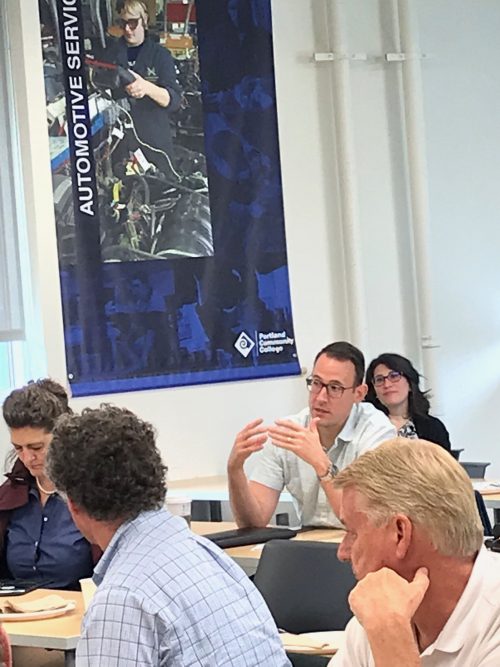This content was published: June 21, 2019. Phone numbers, email addresses, and other information may have changed.
Exploring innovative partnerships for bridging skills gap in manufacturing
Photos and story by Katherine Miller
The cavernous skills gap in the Northwest’s manufacturing sector was front and center at a recent PCC event, where representatives from local firms learned firsthand about how they can partner with the college’s new OMIC Training Center to gain the qualified workers they so desperately need.
The training center is part of the larger Oregon Manufacturing Innovation Center project (OMIC), made up of industry, higher education and government partners and focused specifically on the metals manufacturing industry. OMIC is based on a successful model from Sheffield, England, called the Advanced Manufacturing Research Center, which combines industry research and development with workforce training. The OMIC Training Center will offer innovative manufacturing apprenticeships that will help create economic mobility for students while closing the skills gap.
More than 20 manufacturing firms — including EVRAZ, Boeing, Vigor and Gunderson — attended PCC’s event at Swan Island Trades Center. Some, such as Hilary Pickerel, workforce development manager at Vigor, shared their challenges of being unable to fill key positions.

At a recent event hosted by PCC at Swan Island Trades Center, representatives from Northwest manufacturing firms shared how the lack of skilled workers is affecting business.
“Our biggest need is in mid-to-high level skilled trades positions, and those are harder to fill than entry-level positions,” she said. “More advanced positions can take anywhere from a few weeks to months, or are sometimes left open to allow for continual applicants.
“The work that requires a higher level of skill is not done as efficiently and as quickly as it would if we were able to staff projects with appropriately skilled employees.“
PCC is expected to finalize the purchase of a 17-acre parcel of land in Scappoose in June for the construction of the OMIC Training Center, but the training initiative is already active. Marc Goldberg, PCC’s associate vice president of Workforce Development and Continuing Education, told the event’s attendees that the college already has four out of five new registered apprenticeship programs approved by the State of Oregon: CNC (computer numerically controlled) operator, mill and lathe machinists, and welder fabricator. The industry partners are currently establishing standards for the fifth apprenticeship, mechatronic technicians.
Goldberg explained how manufacturers can partner with PCC to sponsor apprentices to support their development of skills through on-the-job training and related instruction offered by PCC. It’s essentially an “earn and learn” model, and participating manufacturers may qualify for state and federal incentives to do so. When an apprentice completes his or her program — in four years or less — the sponsor gains a journey-level employee.
“This is all industry driven,” said Goldberg. “Employers establish the standards for the OMIC apprenticeships and provide students with work-based learning opportunities and real-time application of classroom learning.”
Kyle Womack, associate principal at Hennebery Eddy Architects, presented a virtual reality tour of OMIC’s proposed 31,000 square-foot facility. He told attendees that the architects wanted to “simulate a real-world, advanced manufacturing environment” that will attract a wide variety of students and apprentices.
“The spaces are designed to be flexible and dynamic, allowing them to be easily adapted to future changes in manufacturing technology,” Womack said. “Visual transparency and connectivity between program areas allows students and visitors to see the various types of manufacturing activities at once. This transparency also provides ample natural light to all spaces, creating a bright, inviting environment for learning.”
Also attending the breakfast event were representatives of Congresswoman Suzanne Bonamici, whose district includes Columbia County. In a statement, the congresswoman praised “PCC’s innovative efforts through the OMIC Training Center.”
“In Northwest Oregon, I often hear from people who need additional skills to compete in today’s economy,” she said. “PCC’s OMIC Training Center will help students and workers gain the skills and knowledge they need to succeed, and it will also help employers by providing a ready workforce.”
Anyone interested in becoming an apprentice or exploring how manufacturing firms can partner with PCC can email apprenticeship@pcc.edu.
